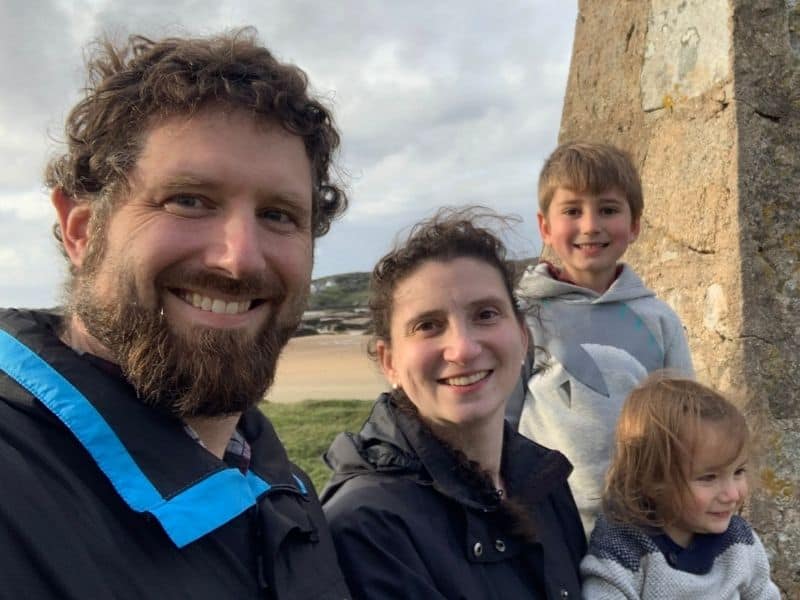
Sara Kift and her husband, Brian, were searching for a way to move their family of four from the United States to Ireland. After several years of trying different paths, in January 2020, they finally obtained an Irish Residence Permit. Sara is using her Post-911 GI Bill, an education benefit she earned through her service in the U.S. Army, as a vehicle for her family to fulfill their dream of living in Dublin.
In this personal interview with Sara, part of our Expat Retiree series, read how she and Brian, both retired U.S. military veterans, were able to make the move to Ireland, what they think about life as American expats in Dublin, and how a chance encounter led Brian to a job that can make the family eligible for permanent residence in Ireland!
Contents (click to expand)
Why did you move abroad? How long were you thinking about it before you actually moved?
Since Brian and I started dating, we loved to travel and had always talked about moving abroad. We placed a high value on raising our children as global citizens with a wide variety of cultural experience.
We both tried to request overseas duty locations while on active duty in the Army, but that never happened for us. Then, Brian transitioned to the Reserves and was able to get an assignment in Germany, but we weren’t able to relocate there as a family.
After Brian left the Army, he applied to many jobs in European countries, but even after many successful interviews, no one was willing to sponsor the necessary work permits or wait for them to be processed. It ended up taking about 3 years to make our move to Ireland a reality.
Why did you choose Ireland and, specifically, Dublin?
We visited Ireland for the first time on our honeymoon in 2013, which we were finally able to take after we had been married for 4 years (thanks to the whole dual military thing). We were stationed in El Paso, Texas at the time, and we both remember the initial approach in the plane into Dublin airport and how green it was. We spent almost 3 weeks in Ireland and fell absolutely in love with the beautiful country, the lifestyle, and the people.
While in Dublin, we did the typical Dublin bucket list things and visited the Book of Kells at Trinity College Dublin. As soon as we walked into the Old Library Longroom, I wanted to study there.

How did you decide to pursue a study visa to obtain residence in Ireland?
Ireland is a particularly hard country to get permission to reside in. The most common ways to become an Irish resident are through Irish ancestry (parent or grandparent), marrying an Irish citizen, or as a student.
There is a retirement stamp in Ireland called a Stamp Zero, but this comes with fairly strict income requirements: $50,000 per year, per person, plus additional income to purchase a house, and the Stamp Zero must be renewed each year.
We decided to go this route to get to Ireland after Brian had tried casually to get a Critical Skills Employment Permit with no luck. My field, Occupational Therapy (OT), is on the list of “ineligible occupations,” which means that, not only is it not on the critical skills list, you cannot be given an employment permit of any kind for it.
We had always talked about me using my GI Bill for something, even though, from a career perspective, it wasn’t something I needed (I already have a doctorate in my field). It almost started as a joke, like “what if I applied for my PhD in Ireland and we moved the family over that way?”
| Related Reading: Moving to New Zealand on a Student Visa
And so, I started calling OT professors at Trinity and found one who was interested in my research area and was willing to supervise my research. I wrote up a formal research proposal for my idea and submitted it, and Trinity accepted me 2 weeks later!
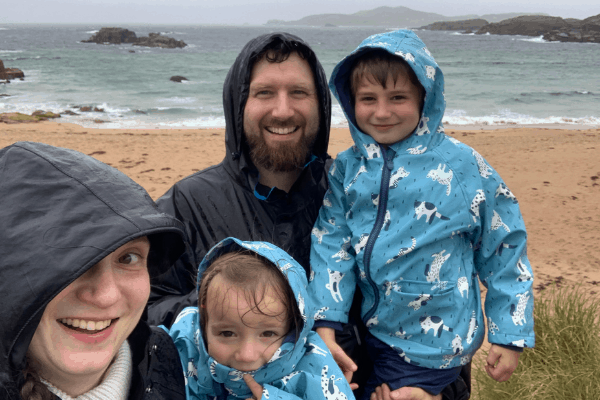
Tell us about the process of obtaining residence in Ireland as a student.
It isn’t actually a student visa to study in Ireland. It’s known as a Student Permission stamp. With the stamp, you can register for your Irish Residence Permit (IRP).
As an American citizen, you don’t need a visa to enter Ireland, but when you arrive with a one-way ticket, you must have a whole sheaf of documentation for Immigration to obtain the Student Permission stamp. You must present your college acceptance letter, proof of private health insurance for all family members (TRICARE met this requirement), bank statements showing that you have enough income to be self-sufficient, etc. You then get a Student Permission stamp from Immigration at the airport and must schedule an in-person appointment at the immigration service office in the area you are living within 3 months.
| Related Reading: Moving to Italy on a Student Visa
Appointments in Dublin are extremely hard to come by, and there are several apps that you can purchase that alert you when new slots open so you can jump on them as quickly as possible. We were able to get our immigration slots prior to entering Ireland, so we presented documentation showing our scheduled immigration appointments at the airport as well.
The actual immigration appointment in downtown Dublin was several hours, including quite a bit of waiting, getting biometric fingerprints taken, bank accounts and health insurance verified, etc. It also cost 300 Euro per adult per year and must be renewed annually.
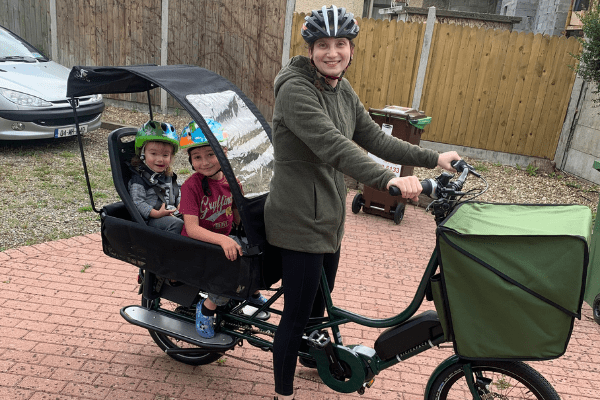
Was it easy to arrange use of your GI Bill overseas? Any tips?
While still in the U.S., I called the VA and was told that as long as it was an accredited school, and I was attending full time, my GI Bill could be used internationally.
Using my GI Bill overseas was initially a bit of a hassle, as no one knew how to deal with it, and who was responsible for handling it at my university. Once I connected with the right person at Trinity, everything went smoothly.
One major thing to be aware of is that the housing allowance is tied to the university’s schedule, and you do not get the full amount when the university is on breaks, even though, as a PhD candidate in a research program, I don’t actually get time off for the breaks (and of course, I still have to pay rent).
Be prepared for multiple phone calls with both the person handling your GI benefits at your school and the VA offices, as there have been multiple random issues that have taken several phone calls to straighten out.
Also, be prepared to facilitate your GI Bill funding every semester or every time your university bills the VA, as this never seems to go through without multiple phone calls and emails on my end.
(Note from Poppin’ Smoke: If you are a veteran who is interested in living abroad after your military career, please join our Facebook group U.S. Military Retirees and Veterans Living Overseas.)
Does a study permit in Ireland come with any restrictions?
There are a few major caveats to coming to Ireland as a student. Unless you are at the PhD level, you are not given permission to have your family live with you in Ireland. The student permit also does not allow the partner to work at all (unless they obtain a Critical Skills job – more on that below), does not allow you to use any public services, such as health care, and does not count as time towards residency.
Students can work up to 20 hours per week.
Your husband was eventually able to obtain a Critical Skills Employment Permit. How did he get it?
Brian is an IT Audit Manager for Mazars Ireland. He did not get this job until after we moved to Ireland.
Brian had attempted for a number of years to get a job in Ireland, as his field (IT auditing) is on the Critical Skills job list. He would get some interviews, but once the company found out he did not have a work permit, the interviews went no further. To get a work permit in Ireland, you must first be hired by the company, who then sponsors you for the work permit for your specific job.
After we moved to Ireland, Brian was the stay-at-home dad while I started my research. He enjoyed the time with the kids, since he missed some of it when Ronan, our 6-yr-old son, was younger (Brian worked long hours in the military, and then we were stationed apart).

Shortly after we got to Ireland, we were at a Financial Independence Meetup group. We were talking with a gentleman at our table, and Brian mentioned his field and that he was looking for a job. Turns out this gentleman had a co-worker who was looking to hire an audit manager. So, he gave Brian’s contact information to his co-worker, who later called Brian to arrange a meeting.
This all happened just before the initial March 2020 lockdown. Brian was able to make one in-person interview with the company. It went well, but once lockdown occurred, we were notified that Mazars was putting a freeze on the hiring process.
Brian enjoyed being the stay-at-home dad until early October 2020 when the company reached out and asked if he was still interested in the position. Brian said yes, the hiring process began again, and he received a job offer. It took 3 weeks for all the Critical Skills Employment Permit paperwork to go through, and Brian started his new position in late October 2020.
How did it go moving to Ireland with kids?
Our kids were a great age to do this move. They were ages 5 and 1 when we arrived in Ireland and were ready for any adventure. Our son had already been in school in the U.S. for several years, and we moved in the middle of Kindergarten for him.
We got incredibly lucky and were able to get him a spot mid-year at an Educate Together school in Dublin. Educate Together schools are multi-denomination schools that are very child-centered and attract a broad international group of students. They usually have multi-year wait lists, and we managed to somehow fall into a free spot, as it was mid-year, and someone had moved, so they had an opening in the Junior Infants class.
School days in Ireland are very different from the U.S. Our son went from going to school from 0715-1515, to going to school from 0830-1315 in Ireland. The shorter day suits him well but is a bit of a challenge to work around with the adult work/school schedules!
Dublin has loads of really lovely outdoor parks and playgrounds. Our children love to run around with other children and have made friends quickly!
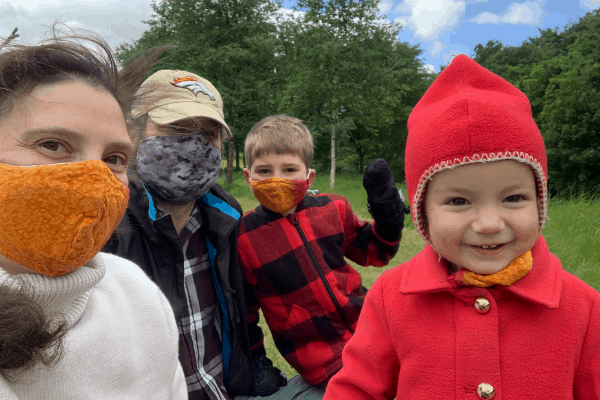
How does the cost of living in Ireland compare to the U.S.?
Moving from Augusta, Georgia to Dublin was a huge change for us in terms of cost of living. Rent prices are one of the largest gaps between Augusta and Dublin. We rented out our 3-bedroom, 2.5 bath, almost-1800sqft house in Georgia for 1400 USD a month. We currently rent a 2-bedroom, 1 bath, 1,000 sqft house in Dublin for almost 2,200 USD (1,800 Euro) a month. We also consider ourselves lucky, because we have a lovely little back garden for the kids to play.
The housing stipend from the GI Bill (about $1,800) does not cover the cost of housing in Dublin. It might cover a rented room in a shared accommodation in Dublin, but that would be about it.
We also owned two cars in the U.S., which we sold prior to moving to Ireland, and we currently do not own a car here. There are some intricacies around getting an Irish driving license which one must do here after a year (and most of it has been put on hold thanks to COVID).
Groceries cost about the same for us here as they did in Georgia (we shop at Lidl in both locations for about $150-$200 a week for 4 people). Dining out in Ireland tends to be quite a bit more expensive than where we lived in the U.S., but is similar to New York City pricing.
One large change is how much less expensive cell phone service is! We have an unlimited plan for two cell phones that costs 25 EUR per month for both of them! The average cost of utilities here is about 200 EUR per month for gas and electricity (similar in price to our utilities in Georgia).
Overall, we spend less money on insurance (no cars), but rent is way more!
Salaries in Ireland are lower across the board then they would be in the U.S. for the same jobs, and this is especially true in the IT/tech sector. With the high cost of living in Dublin, this often means that people live outside the city for a lower cost of living and commute two hours to get to their physical offices.
Where do you get your health care? Do you have a local insurance plan?
All of our health care is through TRICARE Select Overseas. In Ireland, this means that we can see any doctor we want. We have to pay for everything out of pocket, and then submit all claims online through the TRICARE portal. Our payments get direct-deposited from TRICARE, usually 1-2 months after the service, and most things are covered about 75% (up to the catastrophic cap of $3,500 and then everything would be covered).
| Related Reading: Everything You Need to Know About Using Your TRICARE Benefits Overseas
Even without medical coverage, a doctor appointment in Ireland costs only about 60 EUR, and prescription medications are much cheaper than in the U.S. However, medication options in Ireland are more limited than in the U.S., and many prescriptions and over-the-counter medications are simply not available here. Also, you need referrals from a general practitioner (GP) for specialty care in Ireland, and even using private insurance, the wait times for appointments for things like gynecology and neurology are upwards of 6 months.
Brian and I both have coverage through the VA Foreign Medical Program (FMP), but it has not proved to be particularly workable to date. Coverage works differently than in the U.S., and claims take, on average, 8 months to process for us so far. Also, even if you have a 100% VA disability rating, you are only covered by the FMP for conditions for which you are service-connected and rated, unlike in the U.S., where if you have a 100% rating you are covered for basically all care.
You can buy private health insurance in Ireland, but it has a 5-year waiting period for all pre-existing conditions (read: basically everything), and the coverage is less than what we have through Tricare Select Overseas, so we have chosen not to purchase it at this time.
It is highly recommended in Ireland that you do have private health insurance, as the wait times for public health insurance are extremely long (the current wait time for gynecology for public health insurance, for example, is currently 4 years).
As previously mentioned, if you come to Ireland on a student residency stamp, you are also not eligible for public health services anyway and must have proof of private health insurance for Immigration. We had no trouble with this requirement with our TRICARE enrollment letter and ID cards.
One other thing that was highly advised was buying air evacuation insurance. TRICARE, in most cases, does not pay for this. We maintain air evacuation insurance so that if we needed medical care that was beyond the scope or expertise of local care, we would be covered for air evacuation back to the U.S. For our family of four, this costs about $1,000 per year, and would cover us anywhere in the world we might be traveling.
While residing in Ireland as a student, do you pay income tax?
Students are allowed to work up to 20 hours per week on their student residency stamp, and that would be taxed. However, our military retirements/VA are not taxed in Ireland. Brian is now working here, and his income is taxed at the normal rates for Ireland.
Tell us about expat life in Dublin!
This is kind of a funny question for us to answer, as most of our time in Ireland has been during a pandemic, and Ireland has had one of the longest lockdowns of anywhere in the world.
Our average week is school work for me, working from home for Brian, and both of us are managing learning from home for the older child and taking care of the younger one. I am really enjoying taking an Irish language class, which Ronan also gets to take in school.
The weekends, we tend to relax and try to spend as much time outside as we can. We have many lovely parks and canals near our house, so we go for walks/bike rides/picnics as often as we can.
We live within easy walking distance of all the shops we need (Tesco/small shops within a 5 min walk, butcher about 7 min walk, Lidl/SuperValu larger supermarkets within a 15-20 min walk). We have a coffee shop 2 min from our door, restaurants 5 min away, and plenty of delivery options for everything from Indian and Thai to pizza. During the pandemic, nightlife isn’t a thing, but there are multiple pubs within a few minutes’ walk of our door that would normally be open.

Public transportation in Ireland is average. It is better than many areas of the U.S., but also worse than many areas of Europe.
We have several bus stops within a 5-7 min walk of our house and can be in the heart of downtown Dublin in 40 min on the bus. However, the buses don’t run on the most reliable schedule, and it only takes 20 min to bicycle to downtown! We live about a 15 min walk from the Luas (tram) line, which is a pretty efficient way to travel around the city, but biking has actually been the easiest way to get around, especially during the pandemic.
Do you have many friends from the local population, or do you primarily socialize with fellow expats in Dublin?
Our social life here has been a little bit skewed, as we are living through a pandemic in a country that has taken public health very seriously. We have several new friends in our area, many of whom are half-expat couples (expat with an Irish partner).
The general consensus among expats is that it can be harder to make friends with the Irish. Many of them grow up and live in the same area, have the same group of friends all of their lives, and may be a bit set in their ways and not necessarily looking to expand their friend groups. The Irish people are known to be among the friendliest people for casual encounters, but they may not really invite you into their lives.
That said, we have been able to meet a lot of people through a local Meetup group that shares our interest in Financial Independence, through our son’s school community, and through my graduate school student government involvement, which has been great. However, our closest friends in Ireland are an amazing expat community that has provided us with loads of friendship and support while surviving a pandemic far from our home countries.
Do you feel “accepted” in the local community?
The pandemic has made having a foreign accent difficult everywhere in the world, I think. Ireland has been hit hard by the pandemic.
During the summer of 2020 there was a period where there was a lot of anger at American tourists who were coming into Ireland to vacation against the advice of both governments (but the restrictions were not being strictly enforced in Ireland), so there was pretty high anti-American sentiment. During that time period, we felt defensive about our accents when out in public, and even had to justify that we weren’t just “blow-ins” and had been in Ireland since before the pandemic.
However, for the most part, I think we have been accepted locally, though in a place where many live for their whole life, we will always be newcomers. Our neighbors, friends, postwoman and local shop owners know us and are lovely and friendly, so overall, we have been as accepted as possible in Ireland.
What’s the best thing about living overseas and, specifically, about living in Dublin?
We love the lifestyle! We can walk or bike to everything, something that was just not possible where we lived in the U.S. We love our community and our amazing school for our son.
Dublin is a gorgeous city to live in. The parks are well-maintained (well, except the dog poop that is everywhere here!), and lovely to wander around. We are excited that the bicycling infrastructure continues to improve in Dublin as well, making it more bike-friendly. We also love the local FreeCycle movement here. There is a strong emphasis on Zero Waste and caring for the environment in Europe in general.
Dublin is also a great place from which to travel around the rest of Europe. We can hop to just about anywhere from here on a quick and inexpensive flight. Pre-COVID, it cost less than 100 Euro round trip to travel to most major cities in Europe.
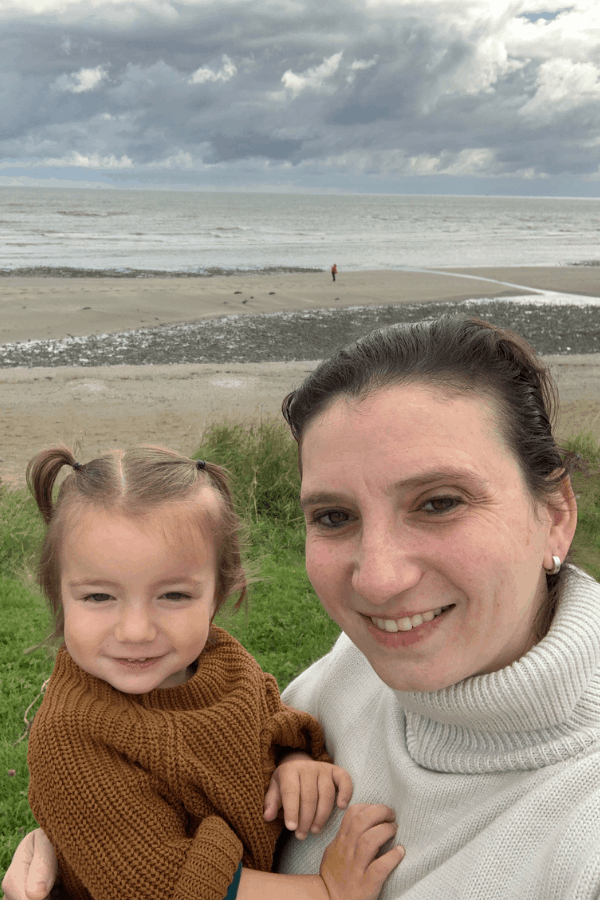
We can’t wait for the COVID restrictions to be lifted so we can visit our friends around the gorgeous Emerald Isle again. We have friendly faces waiting for us in the south in Kinsale and Cork, the west coast by Galway, and County Mayo, and we can’t wait to see them all. We also spent a few days in the North in Donegal last summer and are eager to go back. The wild beauty of the coasts of Ireland still takes our breath away.
What are some of the challenges of living in Ireland?
The distance from our loved ones, and being unable to travel home due to the pandemic has been far and away the hardest part of the last year for us. We miss our family and friends deeply. We also have some challenges with medical needs, and getting started with the correct medical providers and appointments in Ireland was difficult at first.
We have also struggled somewhat with food options! We have food allergies and restrictions, and certain staples of our diets are unavailable in Ireland. Thank goodness for our military expat community and amazing friends in Germany who have mailed some ridiculously large boxes of Chex cereal and Cheerios to Ireland for us (we love you Sarah and Kit)!
What advice would you give to anyone who is thinking of moving abroad? Do you have any specific advice for Ireland?
We wouldn’t advise an international move in the middle of a pandemic. One issue might be registering with a local medical practice. Due to the pandemic, many practices around us are no longer able to take on new patients, so we were thankful to arrive here pre-pandemic and to get in the system before that struck.
Be aware that the pandemic situation has been handled very differently around the globe – what you are seeing around you locally may not be the situation at your chosen destination. Get local intel on the situation at your destination prior to an international move.
Big lessons learned about moving to Ireland for us would be to downsize, and then downsize some more! We started selling/donating/giving away things months before our move and should have started much earlier.
Properties in Ireland are MUCH smaller than their U.S. counterparts, and many don’t have closets. It’s a good idea to consider selling/giving away anything with a plug that isn’t dual voltage. We did end up purchasing a large transformer here for the few electric items we brought, but in hindsight we should have just sold them and bought appliances here.
Also, everything you want to ship into Ireland must arrive within 1 year of your arrival in Ireland or you will have to pay customs and VAT on your own belongings! We ended up doing two shipments to Ireland, because we did not know about the 1-year timeframe and had planned on just storing some things in the U.S. to ship at a later date.
What are your longer-term plans? Do you intend to stay in Ireland for the foreseeable future?
We would love to make Ireland our forever home. Thankfully, Brian was able to get a Critical Skills Employment Permit here so that in 5 years, we can apply for residency. We would love for our children to have the chance to attend universities in the European Union.
However, post-pandemic, I can see needing to travel back and forth to the U.S. for some of our medical care. Ireland is just limited in specialist medical care and availably of appointments, so that may make the most sense for us.
We are potentially interested in purchasing property in Ireland long term. We aren’t sure that we want to be homeowners again but might consider it for the perfect property.
The real-estate market in Ireland is very competitive, with many houses in the Dublin area selling over the market value right now. Also, getting a mortgage in Ireland can be complicated, as they are very, very specific about what they will accept as income (our military retirements DO NOT count as income), and they will only lend you a maximum of 3 ½ times your yearly income. Also, mortgages must be paid off between the ages of 65-70. This means that many expats who want to purchase property in Ireland need to be prepared to pay cash for it.
As a side note, owning property in Ireland does NOT give you any rights to residency in Ireland.
Anything you would like to add to assist retirees in making a decision to live overseas?
Retirees come in a range of ages and physical conditions, but it may make sense to take into account the medical care available to you at your chosen destination. Have a plan, but if you get the chance, just do it!
You can contact Sara on social media via Facebook or Twitter.

